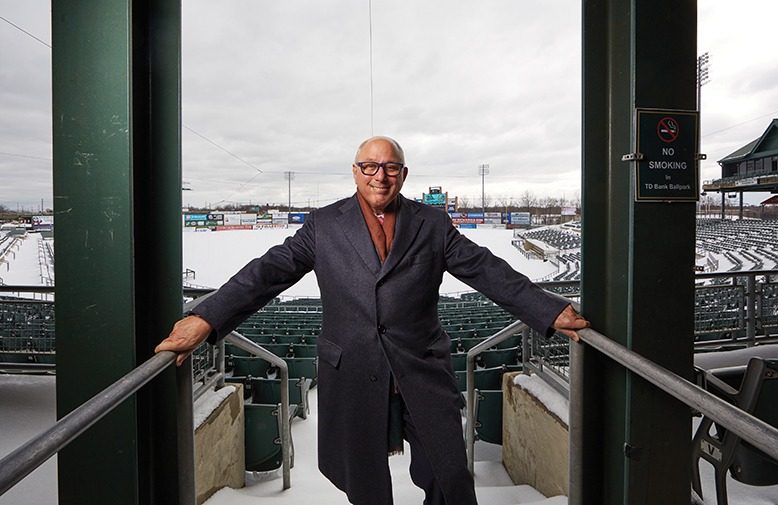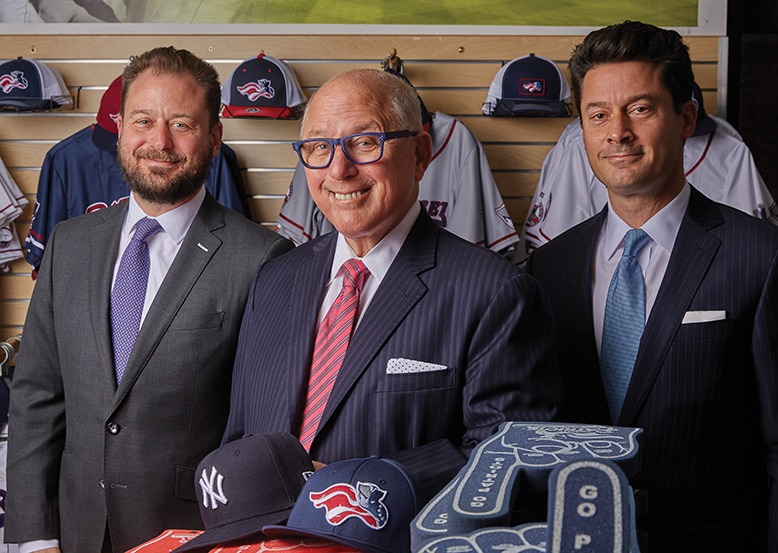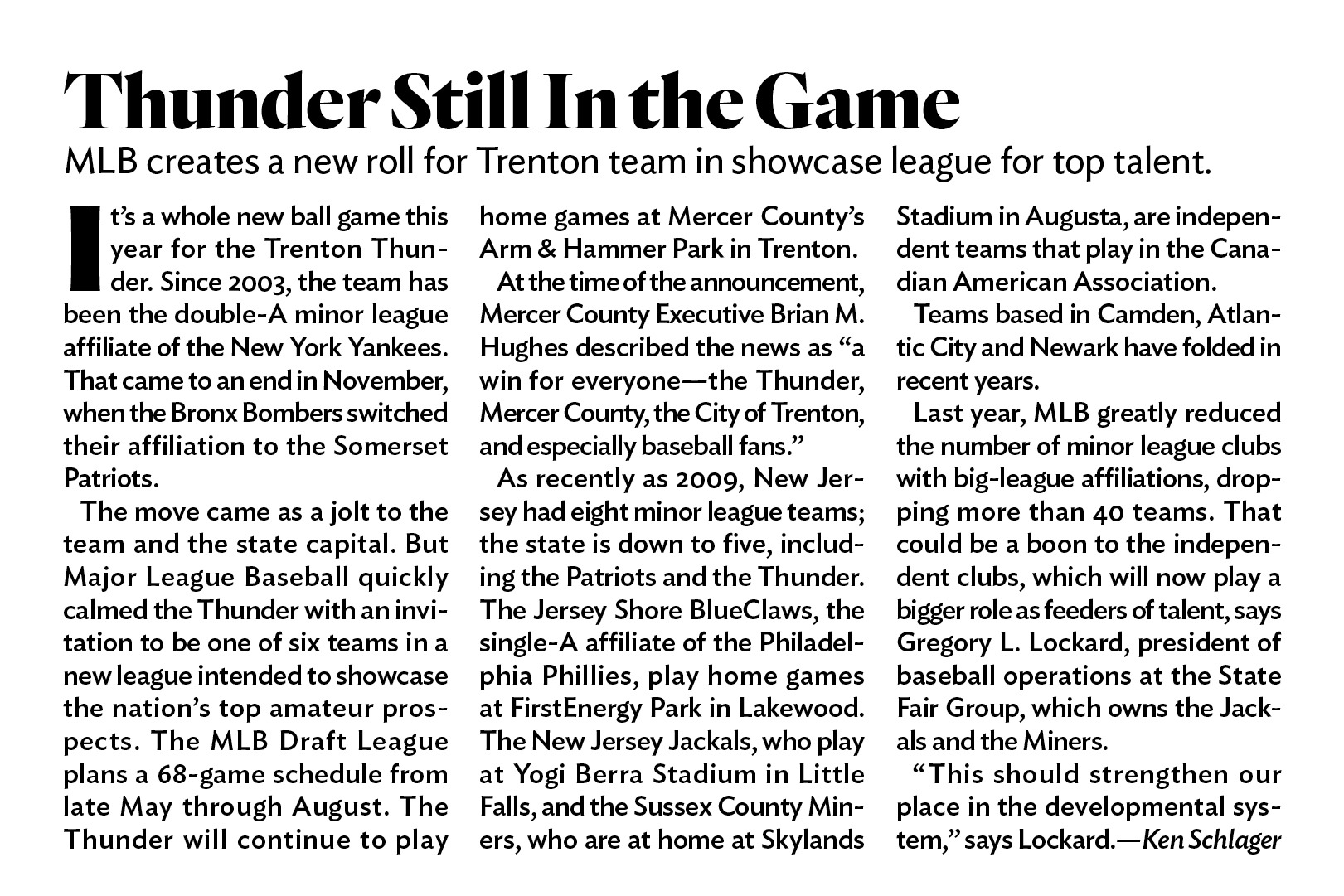
[UPDATE: Steve Kalafer died on April 21, one month after the original publication of this story by New Jersey Monthly. On Facebook and Twitter, the Somerset Patriots announced Kalafer’s death following his long battle with cancer. The story below is based on Ken Schlager’s interview with Kalafer, conducted February 3 at TD Bank Ballpark.]
Steve Kalafer has vivid memories of his first big-league baseball game. It was 1958 at Yankee Stadium: Boston Red Sox against the New York Yankees. “I remember walking out and seeing this immense stadium with the greenest grass. It almost blinded me.”
Then came the moment that took his breath away. Ted Williams, the fearsome Red Sox slugger, hit a pop foul in the direction of young Kalafer and his dad, Milton. The ball wafted toward their seats, descending in what seemed like slow motion. As the elder Kalafer reached out to cradle the sphere, another fan intercepted it in his glove.
These days, Steve Kalafer has no trouble getting his hands on all the souvenir baseballs he wants. Since 1997, he has been owner of the Somerset Patriots, a successful minor league franchise that plays at TD Bank Ballpark in Bridgewater. This year, there’s an added thrill: The Patriots are for the first time affiliated with those New York Yankees. For Kalafer, it’s a game changer—even better, perhaps, than snagging a pop foul as a wide-eyed 10 year old.
“Lifetime baseball fan, lifetime Yankee fan,” is how Kalafer describes his devotion to the national pastime, but there’s much more to this multifaceted entrepreneur. Kalafer’s chain of Somerset County automobile dealerships, plus his real estate and equity investments, have made him one of wealthiest—and most philanthropic—individuals in New Jersey. His personal wealth has been estimated in published reports as high as $750 million.
Kalafer, who turns 72 in August, has also made his mark on the film industry. He has 17 production credits—mostly for documentaries and shorts—and three Oscar nominations. And he’s a dedicated family man. He and his wife, Suzanne—they’ll celebrate their 50th wedding anniversary on June 13—have two sons, Jonathan, 46, and Joshua, 44, and five grandchildren. The senior Kalafer proudly calls Jonathan and Josh his “two greatest assets.”
Born in East Orange, Kalafer grew up mostly in North Caldwell (“before it became fancy”). His father, a businessman who dealt in surplus aircraft hardware, divorced early and raised Kalafer and his older brother, Michael.
“It was just a regular childhood,” Kalafer says. He tells of summer days “getting up at 7 o’clock in the morning, going to Francisco Field in West Caldwell, bringing a bag of two sandwiches. We played baseball all day until 5 o’clock.”
Kalafer usually played catcher. “They actually called me Yogi,” he says. “I was a good hitter, I was a good catcher, but I had a chicken arm.” So much for a career in baseball.

Brothers Jonathan, left, and Joshua Kalafer flank their dad, Steve, in the team store at TD Bank Ballpark. Photo by Fred R. Conrad
Kalafer graduated from West Essex High School and earned a bachelor of science degree in commerce at Rider University, where he played one year on the baseball varsity. (Centenary College and NJIT have since granted Kalafer honorary doctorates in humane letters, and Rider a doctorate of laws.) He began his professional career in banking, but in 1973, fate stepped in. Answering an ad, he landed a position in the business office at Coleman Oldsmobile in Trenton.
“I got in the car business quite by accident,” he says.
Kalafer was never really a car guy as a kid, but he lights up when talking about his first set of wheels: a blue 1965 Plymouth Valiant with a white convertible top. “There was nothing like putting the top down and going to a drive-in movie,” he says. Kalafer was 17 when he purchased the little Valiant for $1,500. The payments were $53.53 a month; five decades later, he proudly reports he made all the payments on time.
At Coleman Oldsmobile, Kalafer advised customers on loans and extended warranties. “I found out I liked the automobile business,” he says, “and I was successful in my role.”
[RELATED: A Conversation with George Norcross]
Eager to have a dealership of his own, he noticed a Mobil filling station in Frenchtown with a small showroom and two gas pumps. He and Suzanne passed it every Sunday on their way to dinner at her grandmother’s home in Milford. It quickly became apparent that the dealership was virtually dormant. “There were cobwebs on the cars,” says Kalafer. “Some had flat tires.”
For the next year, Kalafer repeatedly stopped in and entreated the elderly owner, Bill Ditschman, to sell him the business. Finally, the reluctant Ditschman gave in to Kalafer’s offer. “It cost us more money to buy light bulbs for all of our dealerships in Flemington than it cost me to enter the business in 1976.”
Three years later, Kalafer moved the Ditschman dealership to Flemington. It continues to operate under that name. The Kalafer family now has 17 franchises at nine locations, mostly under the Flemington Car and Truck Country brand—and none under their own name. “I usually think people’s names should go up in lights only in the entertainment business,” Kalafer says.
Still, he adds, his customers recognize—and respect—the Kalafer name. By his count, Kalafer-owned dealerships have sold “a half a million automobiles” over the years.
***
The Kalafers have also been good at selling baseball tickets. Since 1998, 7.5 million fans have attended Patriots games at TD Bank Ballpark—an average of 5,200 per game in the 6,100-seat stadium. The team has won the independent Atlantic League championship six times.
“Steve and his family are great baseball operators,” says Gregory L. Lockard, president of baseball operations at the State Fair Group, which has two independent teams, the New Jersey Jackals and the Sussex County Miners. “The Patriots,” he adds, “have always been a terrific organization and great representatives of independent baseball.”
Amid a realignment of minor league baseball this off-season, Yankee management approached Kalafer about making his Patriots their double-A affiliate—a designation conferred since 2003 on another New Jersey team, the Trenton Thunder. Double-A is the second highest level on the minor league ladder.
Under a 10-year agreement with the Yankees and Major League Baseball, the Patriots agreed to pay a portion of revenues to MLB and fund significant stadium renovations—including improved lighting, dugouts, practice areas and locker rooms. The Yankees will make all decisions on who will manage, coach and play on the team; they also assume team salaries. The team’s home uniforms will be unchanged—except for the addition of a Yankees patch and the traditional Yankees pinstripes.
[RELATED: How Ruthi Byrne Keeps Jersey Connected]
Before making the deal, Kalafer made sure the changes would not burden Somerset County taxpayers—just as he did when he formed the team. At that time, the county had plans to build the ballpark and approached Kalafer about creating a team. With the resulting public-private partnership, the Patriots agreed to cover 100 percent of the debt service (principal and interest) on the stadium, which is owned by the county. “And for 22 years, we’ve been doing that,” says Kalafer, adding that the team has paid more than $21 million in rent to the county over the years.
At deadline, it was too early to tell which Yankees coaches and prospects would be assigned to the Patriots roster. Generally, top prospects play in double-A before leaping to the majors, and current stars are sometimes assigned to such teams for playing time after injuries. “If there was a rehab for Aaron Judge—and I hope there’s not—he’s going to play here,” says Kalafer.
Last season, of course, was a lost one for the Patriots. The entire 70-game home schedule was cancelled due to Covid-19. “It was heartbreaking to our players, heartbreaking to our staff, and heartbreaking to our pocketbook,” says Kalafer. Still, he adds, the team met its financial obligations to the county (“we asked for no relief”) and even created an alternative two-team, 14-game tournament series, with up to 500 tickets sold for each game. “We lost money on every pitch,” Kalafer jokes. But, mindful of the community, the team opened the stadium for other socially distanced attractions, including movie nights and graduation events.
Kalafer is adamant about playing ball this year and fully expects the season to start on May 6—with social distancing, extra sanitation procedures and a likely 50 percent limit on seating capacity.
“We expect the governor to endorse this,” says Kalafer, his voice growing stern. “He knows better than anybody that fans not only miss baseball, they demand it. And there’ll be little understanding by the public if baseball doesn’t take place.”
***
The Kalafer family’s imprint goes beyond the dealerships and the ball field. The Kalafers, with a managing partner, have developed more than 20 real estate sites around New Jersey, including “high-quality residential rentals” and commercial sites occupied by the likes of Costco, Starbucks, Whole Foods and Lowe’s, as well as local businesses.
Kalafer has also developed a reputation for giving back. The Patriots alone claim more than $5.5 million raised for area charities; Kalafer-family giving goes far beyond that. Institutions such as RWJ University Hospital Somerset in Somerville are among the key beneficiaries. The Kalafers’ generosity touches individuals, too. For many years, the Kalafer businesses have picked up all the parking fees for guests at RWJ Somerset.
Again, you won’t see the Kalafer name on any hospital labs or cancer centers the family has funded. “We believe you give to an institution for a reason, and the reason is not to put your name up on a building,” says Kalafer. “The reason is to share your work, your good fortune, and your treasure with others.”
Among his many associations, Kalafer is chairman emeritus of the Somerset Health Care Foundation; serves on the board of RWJ Barnabas Health; and is co-chairman of the Actors Fund of America Chairman’s Council. He’s also a 2020 inductee in the New Jersey Hall of Fame.
While he remains active in all aspects of his enterprises, Kalafer stepped back in 2019 to become chairman emeritus of the Patriots, naming sons Jonathan and Josh as cochairmen.
Neither son went directly into the family businesses—which was fine with Kalafer. “I believe that children should find something they love and pursue it,” he says. In Jonathan’s case, it was education. Jonathan taught for 20 years at Dickinson High School in Jersey City and at NJIT before joining the family businesses. He has also produced and directed numerous films, collaborating with his father on several projects. For Josh, it was real estate development.
Both men are now happy to be working alongside their mentor. “I’ve never stopped learning from our dad,” says Josh. Jonathan echoes the sentiment, adding, “The value of family is, I think, the most important lesson.”
Although he keeps a low profile, Kalafer has been outspoken on certain political issues, including New Jersey’s inheritance tax, which he derides as “the death tax.” He was pleased with Donald Trump’s 2017 tax cut because, he says, “I was able to take the money that the government wasn’t taking and reinvest it in buildings, in equipment, and in our employees.” At the time, he gave $500 bonuses to Patriot staff.
Kalafer makes no secret of his health issues. In 1991, he was diagnosed with non-Hodgkins lymphoma. The disease was long in remission. Now, he says, “cancer returned in 2018. You deal with that as you deal with everything else in life. I don’t want that to be the focus.”
Instead, robust and active, he awaits the two most beautiful words in American English: “Play ball!”




